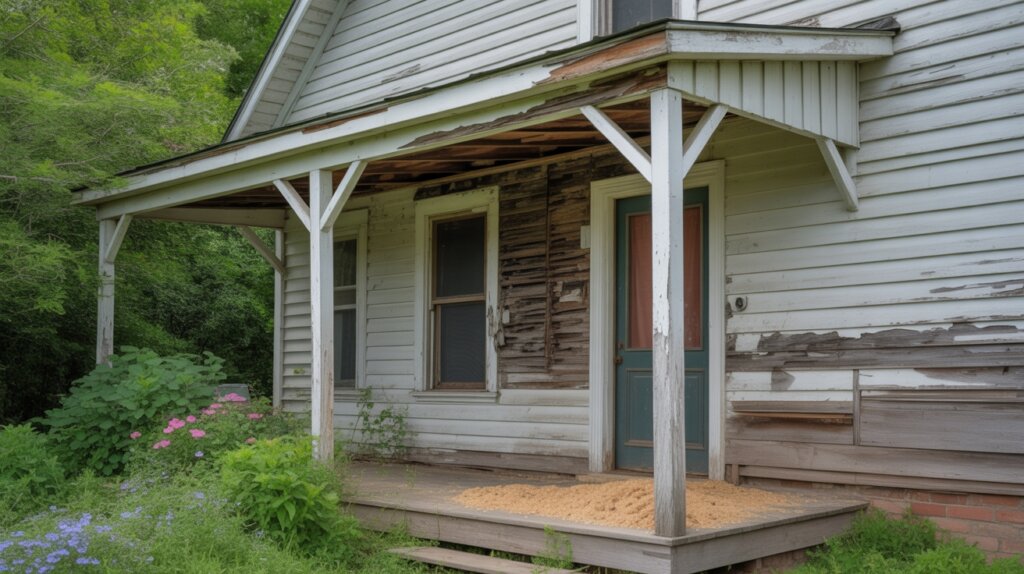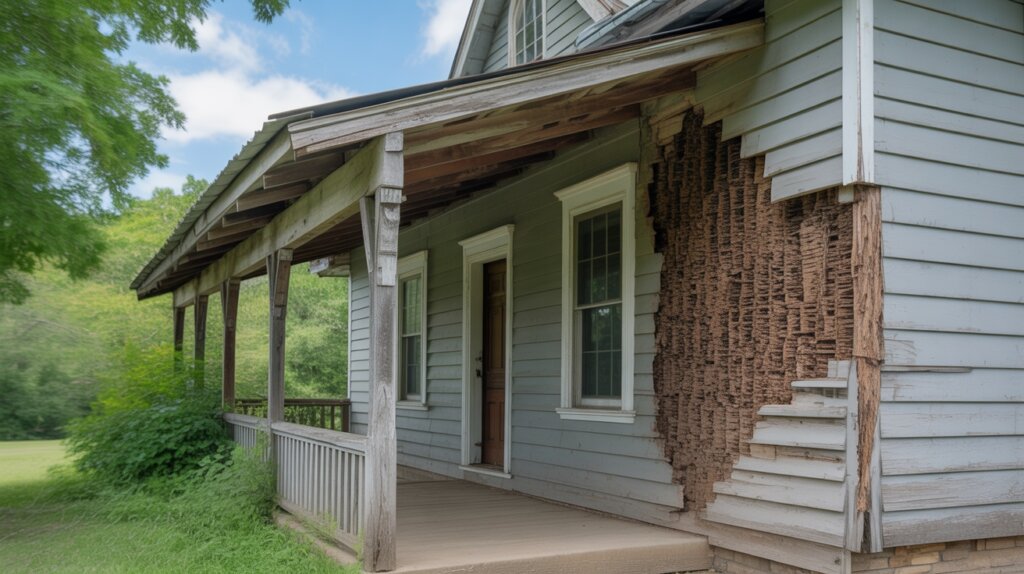Selling a house with termite damage in Kentucky can feel overwhelming. Termites can scare away buyers and lower your home’s value. Kentucky law also requires you to disclose any known termite issues to potential buyers.
This damage can make buyers worry about costly repairs and future infestations. You might face tough negotiations or lose buyer interest completely. Sellers often wonder if they can still close a deal without major losses.
You can sell a house with termite damage in Kentucky by being honest, making repairs, or adjusting your price. With the right steps, you can still attract serious buyers. This blog will walk you through each step to help you sell with confidence.
Key Takeaways
- Disclose all known termite damage and treatments on Kentucky’s mandatory Seller’s Disclosure of Property Condition form to avoid legal issues.
- Obtain a professional termite inspection and repair estimate to understand the extent of damage and provide documentation for buyers.
- Consider repairing the damage or offering repair credits to buyers, supported by professional estimates and documentation.
- Highlight completed termite treatments, warranties, and preventative measures to reassure buyers and boost confidence in the property.
- Work with an experienced real estate agent to price the home appropriately and market it transparently to buyers or investors.
Understanding Termite Damage and Its Impact on Home Value

Termite damage can lower your home’s value and weaken its structure. If termites are present, buyers may offer less money. Damage may also make your home harder to sell. Termite damage weakens your home and decreases its value, making it more difficult to sell and less appealing to buyers.
Termites often eat wood from the inside, making damage hard to spot. If you do not inspect for termites, you may miss early signs. Professional inspectors can find details you might overlook.
If you find termite damage, repairs can be costly. Buyers may avoid homes with past infestations. If you fix problems early, you may keep your home’s value higher.
If you plan to sell, always get a termite inspection. This helps prevent legal issues and gives you a stronger position with buyers. Regular checks keep your home safe and valuable. Understanding mortgage options can help you address underlying issues before listing your property. Additionally, addressing structural weaknesses early can prevent further deterioration and protect your investment.
Kentucky’s Disclosure Laws for Termite Issues
Kentucky law requires sellers to tell buyers about any known termite damage or past infestations. Sellers must report this information on the Seller’s Disclosure of Property Condition form. Full disclosure is necessary when selling a home.
If you do not share known termite issues, you risk legal problems or losing the sale. Buyers in Kentucky expect honest information about termite history. Accurate disclosure protects both the seller and the buyer.
If you have treated for termites or found damage before, you must mention it. Hiding details is not allowed and can result in lawsuits or fines. Honest reporting builds trust and avoids future disputes.
Additionally, understanding structural damage caused by termite infestations is critical, as untreated damage can compromise the integrity of the home and lead to costly repairs.
How to Spot Signs of Termite Damage in Your Home

You can spot termite damage in your home by looking for clear warning signs. Early detection is important because termites can weaken your home’s structure. If you see any signs, take action quickly to avoid costly repairs. Moisture problems and damp conditions often attract termites, making regular inspections crucial in humid regions like Kentucky. Additionally, understanding local termite risks can help you implement preventative measures. Look for early warning signs of termite damage in your home to prevent costly repairs and protect your home’s structure.
Termites often live in warm and humid places, such as in Kentucky. They usually damage wood from the inside out, which can make wood sound hollow. Damaged wood may also look blistered or warped.
Mud tubes on foundation walls are a sign of termites. Discarded wings near windows or doors mean termites may have entered your home. If you notice any of these, you should contact a professional for an inspection.
Catching termite activity early protects both your home and its value. It also helps you follow local sale and safety laws. Regular checks can save you stress and money in the long run.
Getting a Professional Termite Inspection
A professional termite inspection checks your home for termite damage before selling. In Kentucky, buyers want clear and honest information. An inspection provides proof of any problems and helps meet legal rules.
A licensed inspector knows where termites hide and how to spot their damage. They use special tools and training that go beyond a simple look around. If you hire a reputable company, you get a detailed report for your records. Conducting a thorough inspection also helps identify title issues that could affect the sale process and ensures transparency.
Lenders often require an official termite inspection report before approving a loan. This report can protect you if issues come up later. If any infestation is found, you will need to document it and share it with buyers.
Performing a termite inspection also helps you understand the full scope of property damage and plan accordingly. If you take this step early, you build trust with buyers and avoid legal trouble. Kentucky law says sellers must share known problems. Proper inspections help prevent disputes or canceled sales.
Estimating the Cost of Termite Repairs

You need a clear estimate of termite repair costs to price your home and negotiate. Termite species cause different damage, which affects costs. In Kentucky, sellers must give accurate repair estimates for legal and trust reasons. If the damage is only on the surface, repairs may cost less. If the damage is structural, costs can increase. Previous pest control treatments can also impact repair needs. Material type matters when estimating costs.
Hardwood, framing, and drywall can all be affected differently. Local labor and material prices also change the final cost. Get detailed quotes from contractors to plan your pricing. If the damage involves hidden or extensive issues, understanding the liens and title status can help prevent surprises during closing. Additionally, understanding the window replacement ROI and related costs can be beneficial if windows are part of the damage repair plan. Accurate numbers help you stay compliant and build trust with buyers.
Repairing Termite Damage: DIY vs. Professional Services
You’ll need to assess how severe the termite damage is before choosing between DIY repairs or hiring a professional. Weigh the upfront savings of doing it yourself against the long-term value and legal peace of mind that certified repairs can offer in the real estate market. Don’t overlook the importance of ensuring lasting protection, as inadequate repairs could create disclosure issues and affect your sale.
Additionally, repair costs, especially when damage is extensive, can make a professional assessment worthwhile to prevent future costly repairs. For homeowners looking to sell quickly and avoid the hassle of repairs, considering options like a hassle-free cash sale can be a practical solution.
Assessing Damage Severity
Assessing damage severity means finding out how bad the termite problem is. A clear assessment helps you decide what to do next. If you know the damage level, you can plan repairs or other steps.
Check for visible structural damage like hollowed wood or sagging floors. Look for mud tubes, as these show termite activity. If you see these signs, the problem could be serious.
Inspect hidden spaces such as crawl spaces and attics. Termites often hide there, making damage hard to spot. A careful inspection helps you find all affected areas.
If you find active termites, the infestation may be ongoing. If damage is only in one spot, repairs may be easier. Widespread damage could mean bigger repairs and higher costs.
Accurate assessment helps you meet legal rules in Kentucky. If you plan to sell your property, you must share this information. Early action can protect your property’s value.
Cost Comparison Analysis
Repairing termite damage can cost less if you do it yourself. DIY repairs may seem cheaper because you only pay for materials. However, you must add inspection fees to meet Kentucky’s requirements.
Professional repairs cost more, but experts provide better results and often include warranties. These services can increase buyers’ trust and allow for a higher selling price. If you want to make a good impression, professional repairs are a safer choice.
If you skip professional help, you might miss hidden damage or legal steps. This can cause problems during negotiations or when selling your home. Always consider both the price and the risks before choosing a repair method.
Ensuring Long-Term Protection
Professional termite services are the best way to protect your home for the long term. DIY fixes only hide problems, while professionals treat the real cause. Termites can stay hidden, so surface repairs will not stop damage.
Experts use special tools to find termites and any hidden damage. Their treatments are safe for the environment and follow all laws. These services help keep your home safe and easy to sell.
If you use a professional, you can get a warranty that transfers to the next owner. This gives buyers confidence and helps with legal rules. Investing in these services shows you care about your home’s health and value.
Options for Treating Active Termite Infestations
If your house has an active termite problem, you must take care of it before selling. Kentucky law requires you to tell buyers about termites. Fixing the issue helps protect your home’s value and completes the sale smoothly.
You can hire a pest control company or try fixing the problem yourself. Professionals provide full treatments, paperwork, and warranties that may satisfy buyers and lenders. DIY methods might be allowed for small problems, but may not meet legal or buyer standards.
Always use approved chemicals if you try to treat termites yourself. If you use any pest control, tell the buyer about it. Honest disclosure avoids legal trouble and keeps the sale process clear.
Deciding Whether to Fix the Damage Before Selling
You’ll need to weigh the cost of repairs against your expected return, as buyers often factor visible damage into their offers. Today’s market favors transparency, so understand what local buyers expect and how unrepaired termite damage might impact your sale. Remember, state disclosure laws require you to inform buyers about known issues, and skipping repairs could increase your legal risks. If you’re in Crestwood, KY, and want to sell quickly, considering how foundation issues and termite damage influence buyer expectations can help you make an informed decision.
Assessing Repair Cost Value
When deciding to repair termite damage before selling, compare the repair costs with the impact on your home’s sale price. Repairs may help your home sell faster and for more money. Professional damage appraisal is the first step to understand the problem.
A licensed inspector can tell you if you need simple treatment or major repairs. Kentucky buyers and agents will look closely at these issues. Sellers must be honest and follow state disclosure laws.
Consider the total costs for treatment and repairs before making a decision. Think about how much these repairs might raise your home’s value. If you must disclose damage, being upfront helps you avoid legal trouble. Knowing these facts lets you make clear and smart choices. You can then decide if repairs are worth the investment.
Weighing Market Buyer Expectations
Buyers in your market expect certain features in a home. In Kentucky, many buyers want nice gardens and good neighborhood amenities. If your home has these, buyers will expect the rest of the house to be in good condition.
Visible damage can turn away buyers or lead to lower offers. This is more likely in competitive neighborhoods. If your area has fast sales, you may sell “as-is” even with minor issues.
Recent sales and advice from local agents can help you decide. If most buyers expect repairs, fixing damage may boost your sale price. Consider your market before making repairs.
Disclosure Laws and Risks
Kentucky law says you must tell buyers about any known termite damage or pest problems. You do this on the Seller’s Disclosure of Property Condition form. If you do not share this information, you could face legal trouble.
If buyers find undisclosed termite damage, they can take legal action against you. The sale could fall through if the damage is discovered during a home inspection. Your reputation as a seller may suffer if you are not honest.
Buyers may ask for repairs or a lower price if you disclose damage or pest history. Full disclosure helps avoid misunderstandings later. If you are unsure, it is safer to report any known issues.
Marketing Your Home With Known Termite Damage
When selling a home with termite damage, always disclose this information to buyers. Transparency builds trust and follows real estate laws. If you are upfront, buyers can make informed decisions. Providing clear documentation of professional inspections and treatments demonstrates your responsible management of the issue. Additionally, highlighting any damage assessment reports and repair records can reassure buyers of the property’s condition and your honesty.
Explain how termites caused the damage and what repairs were done. If the damage is treated and documented, buyers may see renovation potential. Investors often look for homes that offer value and growth. Keep all reports and receipts ready for review. Ensuring a clear title by resolving any ownership or lien issues before selling can further facilitate a smooth transaction. This practice protects you legally and supports your asking price. If buyers feel confident, negotiations may go more smoothly.
Negotiating With Buyers Over Termite Issues
When you negotiate with buyers, you’ll need to disclose all termite damage upfront to comply with legal requirements and maintain trust. Many sellers offer repair credits, which can help bridge the gap between buyer concerns and your bottom line. Understanding these tactics positions you to protect your interests while keeping the deal on track.
Disclosing Damage Upfront
Disclosing termite damage upfront builds trust with buyers and satisfies Kentucky’s legal requirements. Sellers must reveal any known termite problems. This includes past infestations or damage.
Kentucky law protects honest sellers from future lawsuits and penalties. If you hide damage, you risk legal trouble later. Full disclosure keeps you compliant.
Buyers feel more confident when you share termite history and repairs. If you treated the soil or fixed damage, say so clearly. This honesty can make buyers more comfortable.
Being open puts you in a better position for negotiation. Buyers appreciate straightforward sellers. If you disclose damage early, you may avoid delays or disputes.
Offering Repair Credits
Offering repair credits can help you sell a home with termite damage. A credit lets buyers handle repairs after closing. This often keeps negotiations moving and helps protect your sale.
Buyers may prefer choosing their own contractor or timing repairs with other home updates. If you offer a credit, base it on a professional estimate. Buyers might ask for this paperwork or do their own inspection.
Sellers must disclose all known termite problems and any steps taken to prevent damage. A repair credit can shift focus from the damage to the home’s future potential. This approach helps both sides reach a fair and timely agreement.
Selling to Investors or Cash Buyers
Selling a house with termite damage is easier if you target investors or cash buyers. These buyers often purchase homes “as-is.” You do not need to make repairs or treat the wood before selling.
Investors understand the Kentucky market and expect to handle repairs themselves. They factor the cost of fixing termite damage into their offers. This approach saves you time and effort.
If you sell to a cash buyer, the process is faster and simpler. You avoid negotiating over repairs or pest control credits. Cash buyers usually waive inspection and loan contingencies, so deals are less likely to fall through.
Tips for Staging a Home With Past Termite Problems
When staging your home after termite repairs, highlight all professional remediation and show buyers documented proof of work completed. Make it clear you’ve invested in preventative treatments and ongoing maintenance, which reassures buyers about long-term protection. Showcase spotless, damage-free spaces to reinforce your home’s current condition and market value.
Highlight Professional Repairs Completed
Professional repairs completed after termite damage should always be highlighted. Buyers in Kentucky want proof that all damage was fixed by experts. If you show these repairs, buyers will trust your property more.
Include clear before-and-after photos that display the repairs. Use photos that focus on quality work and the materials used. If possible, choose pictures that show progress step by step.
Add copies of invoices and warranties from licensed contractors and pest control companies. Documentation should list the company name and the date of service. If a warranty exists, make sure buyers see it.
Prepare a summary sheet that lists every repair. Include the date, the company, and the type of work done. If you keep this information organized, buyers will find it easy to review.
Emphasize Preventative Measures Taken
Taking steps to prevent termites after past damage can help calm buyers’ worries. Showing proof of prevention can make your home more attractive in Kentucky. Buyers want to see that you have taken pest control seriously.
You should offer recent inspection certificates or pest control contracts. These documents show you are honest and meet legal requirements. They also prove your house is protected from future termite problems.
If you show records of annual pest control, buyers can feel confident about the condition of your home. Service records for termite treatments give proof of long-term care. Moisture management warranties show you have reduced the risk of new infestations.
Consistent termite prevention can increase your home’s value and ease buyer concerns. If you share these details, buyers may feel safer making an offer. This can help your home stand out in a competitive market.
Showcase Clean, Damage-Free Areas
Buyers in Kentucky want to see clean, damage-free areas after termite repairs. If your home looks well-kept, you will attract serious buyers. A tidy home also reduces concerns about past damage.
Good curb appeal creates a strong first impression. Fresh landscaping, trimmed bushes, and neat walkways show that you care for your property. If you keep the outside neat, buyers may feel more confident.
If you stage the inside with light colors and remove clutter, the home will look brighter and more inviting. Neutral decor helps highlight the best features. Clean, open spaces make it clear there is no hidden damage.
If you keep repaired areas spotless and well-lit, buyers will notice your attention to detail. Well-maintained repairs show you follow Kentucky’s disclosure laws. If buyers see these efforts, they may feel more comfortable making an offer.
Working With Real Estate Agents Experienced in Termite Sales
Working with a real estate agent who knows about termite sales can help you sell your home more easily. These agents know how to show your home’s best features and talk honestly about any termite history. They can help buyers see the value in your property.
A good agent understands Kentucky’s laws about telling buyers about termites. This helps you avoid legal problems when selling your home. They can also connect you with repair experts if needed.
If you want to set the right price, an agent will look at both repairs made and current market values. They can help you stage your home and improve its curb appeal. Their guidance can attract serious buyers, even if there were termites before.
Preventing Future Termite Problems for Potential Buyers
Preventing future termite problems can make your home more appealing to buyers. Buyers want to see that you have taken steps to protect the property. If you act early, you can avoid surprises during the sale process.
Sellers in Kentucky should consider pest control before listing a home. Professional treatments can show buyers that you care for the property. Keep all pest control records to share with potential buyers.
A home inspection should include a termite report. If you have treated or repaired anything, highlight these details in the report. This can help meet disclosure requirements.
Fix areas where termites might enter, such as cracks or wood touching soil. Repair leaky gutters to keep moisture away from the foundation. These simple steps can reduce future termite risks.
Conclusion
If you want to sell a house with termite damage in Kentucky, honesty and preparation are key. If you disclose all known issues and arrange a professional inspection, you can gain buyer trust. If you repair the damage or offer credits, you may increase your chances of a smooth sale.
If you feel overwhelmed by repairs or the process, you have other options. If you need a fast and easy solution, we buy houses for cash in any condition. If you choose this route, you can avoid repairs and lengthy negotiations.
If you are ready to sell your house quickly, OC Real Estate is here to help. We offer cash offers and a simple selling process. If you contact us today, we can guide you every step of the way.

